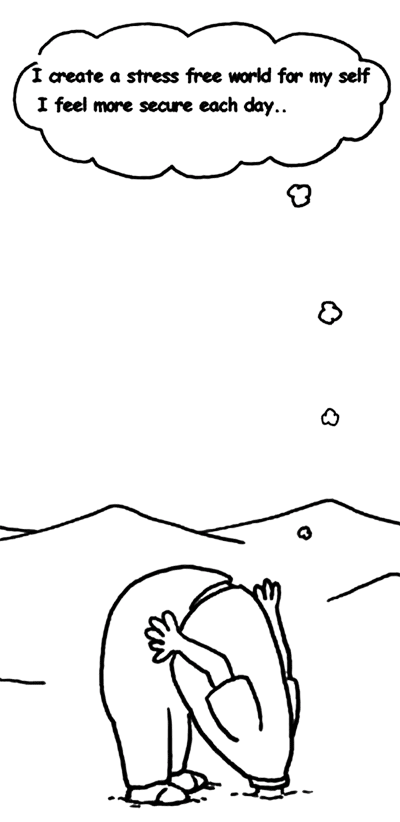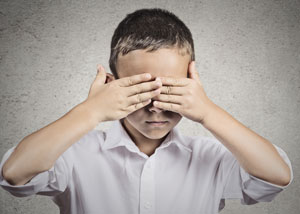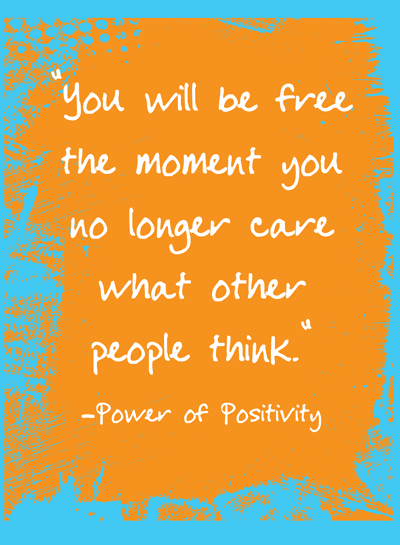
WHAT IS AVOIDANCE?

Avoidance is a common reaction to any kind of trauma. It is natural to want to avoid repeating, thinking about or feeling emotions about a stressful event — like getting teased in gym class. But when avoidance is extreme, or when it’s the main way you cope, it can interfere with your overall health and well-being.
DIFFERENT TYPES OF AVOIDANCE

There are different types of avoidance, both emotional and physical.
- Emotional avoidance is when a person avoids thoughts or feelings about a traumatic event, like someone telling himself if they don't think about the teasing, they can "erase" the experience.
- Behavioral avoidance occurs when a person actually attempts to avoid the experience or environment that the trauma occurred in, like gym class.
- Partial avoidance occurs when someone can't escape a traumatic environment, like a mandatory gym class. Rather than risk the consequences of avoiding gym, someone might develop a "safety behavior" like avoiding contact with kids that are likely to tease or trying to ignore their behavior by daydreaming or singing to themselves.
CONSEQUENCES OF AVOIDANCE
While most times it is good to avoid negative experiences, there are times that avoidance is not healthy — particularly when it takes someone away from participating in activities that are good their well-being, like exercise.
YOU PRACTICE AVOIDANCE?

Experts say if you avoid experiences that create anxiety or create unhealthy ways to cope, your anxiety will not diminish. They recommend that you talk to your parents or a sympathetic teacher to develop an action plan to help address the problem, like the gym bully (see bullying).
SOMEONE YOU KNOW PRACTICES AVOIDANCE

If you have a friend who is avoiding experiences due to anxiety, let them know that you recognize the problem and want to help. Listen to their concerns and encourage them to get help. If you think their behavior is dangerous to themselves or others tell an adult — immediately.
HOW TO GET HELP

Anxiety disorders affect one in eight teens.
There are medications and therapies that can help alleviate symptoms, and now there’s even an app that can help.

Negative People, Thinking and Situations: Overcome and Win
Caroline Jalango talks about fighting feelings of inadequacy, low self esteem caused by her own negative thoughts and negative people in her life. She encourages us to be authentic and believe in ourselves enough to fight and defeat the inner and outer critical voices that attempt to sabotage us. One way to do this is by focusing our attention on helping others.
Editor's Note: Caroline Jalango is an intuitive coach and founder of Crystals Talk, an organization created to help others heal through self-affirmation and awareness. Jalango came out of a emotional, tumultuous, and very dark period in her life with a spiritual awakening which led to her interest in crystals and metaphysics. Her guiding principal: Know yourself first, then adorn yourself accordingly This video is posted with the expressed permission of Caroline Jalango.
Difficult Conversations STOP avoiding them!
Filmmaker Michael Gebben (Gebbs) is a self-proclaimed master of avoidance. He took to the TED Talk stage to share how he copes with his own personal challenges with avoidance, and tells others how they can too. Learn how his life, his relationships and his prospects have improved as he began to do “more” and avoid “less.”
Warning: count(): Parameter must be an array or an object that implements Countable in C:\inetpub\webroot\theweigh\templates\protostar\html\com_k2\dearabs_content\category.php on line 254




